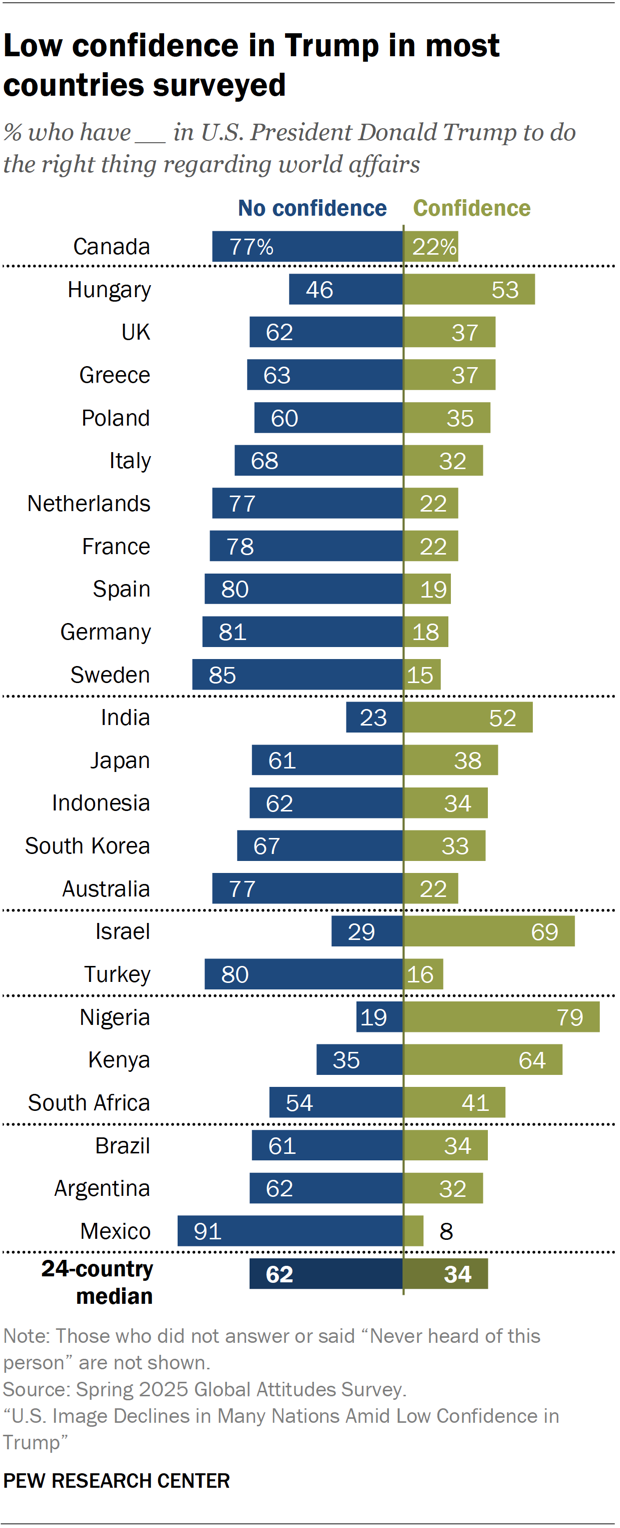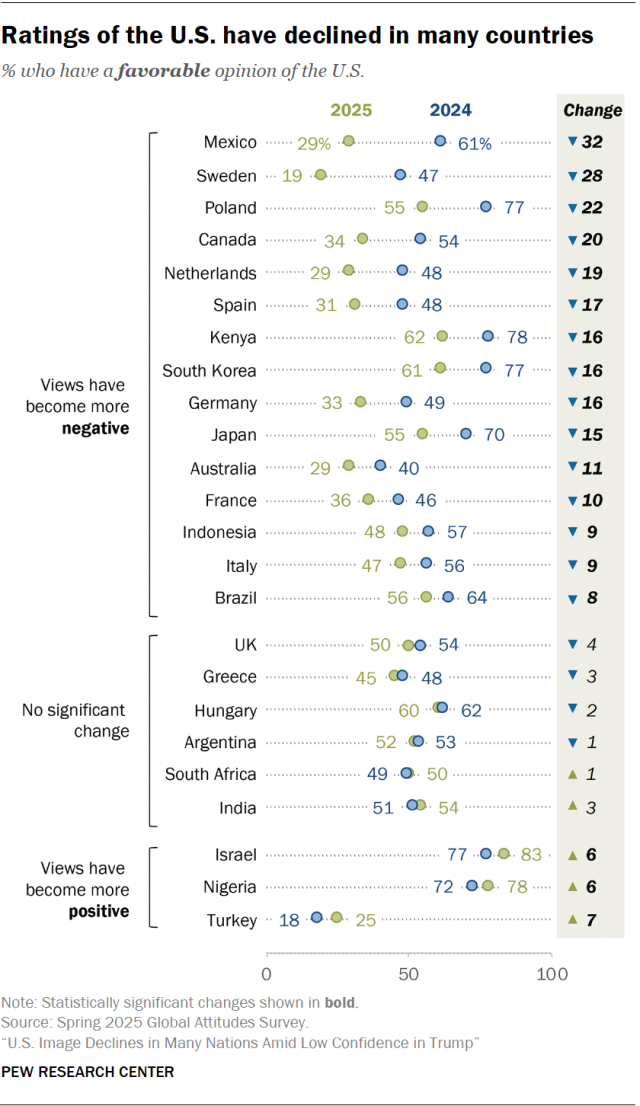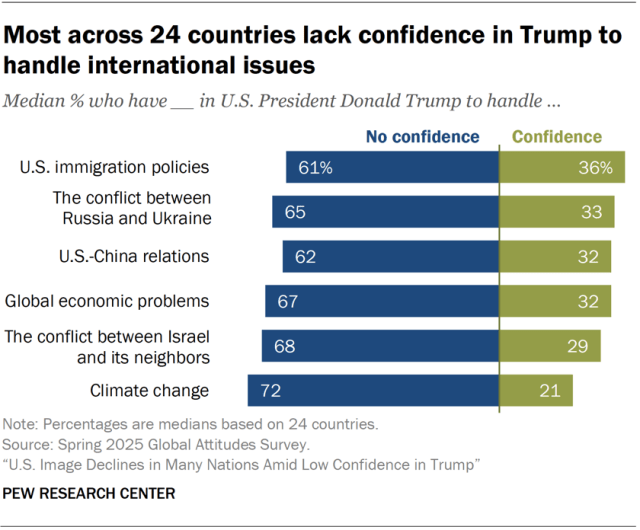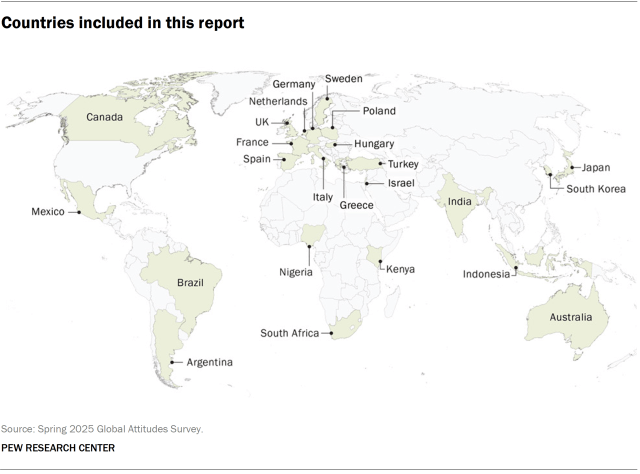
U.S. President Donald Trump receives mostly negative ratings in a new Pew Research Center survey of 24 nations. More than half in 19 of these countries say they lack confidence in Trump’s leadership of world affairs.

Majorities in most countries also express little or no confidence in Trump’s ability to handle specific issues, including immigration, the Russia-Ukraine war, U.S.-China relations, global economic problems, conflicts between Israel and its neighbors, and climate change.
When asked about Trump’s personal characteristics, most describe him as arrogant and dangerous, while relatively few see him as honest. Still, majorities in 18 countries consider Trump a strong leader.
In most nations, views about Trump differ sharply along ideological and partisan lines. People who place themselves on the right and those who have favorable views of right-wing populist parties in Europe tend to view Trump more favorably.
Overall ratings of the United States have declined in 15 nations since last spring, including drops of 20 percentage points or more in Mexico, Sweden, Poland and Canada.

In six countries, there has been no significant change in views of the U.S.
People in Israel, Nigeria and Turkey have become more likely to give the U.S. a favorable rating since last year. Israel and Nigeria are two of the five nations (along with Hungary, India and Kenya) where half of adults or more express confidence in Trump’s handling of world affairs.
For this report, we surveyed 28,333 people in 24 countries, not including the U.S., from Jan. 8 to April 26, 2025.
Fieldwork in every country except Indonesia began after Trump’s second-term inauguration on Jan. 20. Most interviews were conducted after the meeting between Trump and Ukrainian President Volodymyr Zelenskyy on Feb. 28 and before Trump announced tariffs on countries around the world on April 2. Refer to Appendix A for more information on our survey fieldwork period.
Jump to:
- Views of the United States
- Confidence in Trump to do the right thing regarding world affairs
- Confidence in Trump to handle specific international issues
- Views of Trump’s characteristics
- Confidence in Trump, Macron, Xi and Putin
Confidence in U.S. presidents over time
Pew Research Center has measured international attitudes toward the U.S. and its presidents for over two decades, highlighting important changes in public opinion.
Trump received largely negative reviews internationally during his first term in office. Many people opposed his policies on trade, climate, immigration and other issues. Joe Biden’s ratings were generally higher, although confidence in him declined during his presidency in many nations.
Comparing ratings of Trump this year with ratings of Biden in 2024:
- Trump receives lower marks than Biden in 13 countries.
- Trump gets higher ratings in six countries.
- In five countries, there are no significant differences.
Findings from France, Germany, Spain and the United Kingdom highlight some long-term trends in views of recent presidents. People in these countries tend to have less confidence in Trump than they had in Biden last year. Still, they tend to rate Trump more highly today than during his first term in office.

Ideology, gender and views of Trump

In most countries where we measure political ideology, people on the right see Trump more favorably than those on the left. In many cases, these ideological gaps are quite wide. For example, in Israel, 93% of those who place themselves on the right express confidence in Trump, compared with 21% of people on the left.
In several countries, compared with the start of his first term, confidence in Trump has increased particularly among those on the right.
Attitudes toward right-wing populist parties in Europe also relate to opinions of Trump. For example, 56% of Germans with a favorable view of Alternative for Germany (AfD) also have confidence in Trump. Among those who see AfD negatively, only 8% have confidence in him. (Read Appendix B for more information on how we classify populist parties.)
There is a similar pattern among supporters of right-leaning parties in other regions. Trump receives relatively high ratings among supporters of former Brazilian President Jair Bolsonaro’s Liberal Party, Israeli Prime Minister Benjamin Netanyahu’s Likud Party, Argentina President Javier Milei’s La Libertad Avanza, and the People Power Party of former South Korean President Yoon Suk Yeol.
There are also significant gender gaps in 17 nations, with men more likely than women to have confidence in Trump’s leadership on the world stage.
Trump’s handling of international issues
Trump mostly gets low ratings for his ability to handle major international issues.
What is a median?
Throughout this report, median scores are used to help readers see overall patterns in the data. The median percentage is the middle number in a list of all percentages sorted from highest to lowest.
Of the six issues included on the survey, Trump gets relatively high ratings on U.S. immigration policies – though these assessments still lean negative. A 24-country median of 36% have confidence in Trump to deal with immigration, while 61% have little or no confidence. He receives the most negative ratings on immigration in Mexico, where 87% do not have confidence in him on the issue.

Trump gets his lowest overall marks on climate change. A median of 21% express confidence in his ability to deal with climate change, while 72% lack confidence.
In nine of the 11 NATO allies we surveyed, roughly six-in-ten adults or more say they do not have confidence in Trump’s handling of the Russia-Ukraine war. The exceptions are Hungary, where 54% do have confidence in him, and Greece, where opinions are divided.
Among the United States’ East Asian allies, there is little confidence in Trump’s ability to handle U.S. relations with China. Six-in-ten adults or more in Japan and South Korea express little or no confidence in him on this issue. And about three-quarters of Australians (77%) lack confidence in Trump to handle relations between the U.S. and China.
A 24-country median of 67% lack confidence in Trump to handle global economic problems. (Most of our survey work was conducted prior to his April 2 announcement of tariffs on nations around the world. For more, refer to Appendix A.)
About six-in-ten Israelis (62%) have confidence in Trump to deal with the conflict between Israel and its neighbors. Opinions are especially positive among Israelis on the ideological right (83% have confidence in him on this issue vs. 21% of those on the left). Similarly, Israeli Jews are more likely than Israeli Arabs to have confidence in Trump (73% vs. 26%). Trump’s most negative ratings on this issue are in Turkey and Mexico, where 87% and 85% have no confidence in him, respectively.
Trump’s personal characteristics

We read survey respondents a list of seven characteristics and asked whether each one does or does not describe Donald Trump. The term respondents most commonly associate with Trump is “arrogant.” A median of 80% across the 24 nations say this describes him.
Two-thirds consider Trump a “strong leader.” The share of the public who see him this way has increased in many nations since we first asked this question in 2017. Significant increases have taken place in countries where Trump is relatively popular – such as Hungary, India and Nigeria – as well as in places where most people lack confidence in his leadership – including Greece, South Korea, Turkey and the UK.
About two-thirds of people also say that “dangerous” describes Trump and that “honest” does not. About four-in-ten think he “understands complex problems,” is “diplomatic” and is “well-qualified to be president.” In nearly all countries where trends are available, more now say Trump is well-qualified than in 2017.
In most nations where we asked similar questions about Biden in 2021, people are more likely to describe Trump than Biden as arrogant or dangerous. And they are less likely to describe Trump as well-qualified to be president. On the question of being a strong leader, the pattern is mixed.
Rating other world leaders

In addition to Trump, we asked about confidence in President Emmanuel Macron of France, President Vladimir Putin of Russia and President Xi Jinping of China. Macron gets the highest ratings of the four: A median of 46% express confidence in him, while 42% lack confidence.
Ratings of Trump are somewhat more positive than ratings of Xi, while Putin gets the lowest marks. Just 16% across all 24 countries have confidence in the Russian leader.
Democracy and partisan conflict in the U.S.

Survey respondents are divided about the health of democracy in the U.S. A median of 50% say U.S. democracy works well, while 46% believe it works poorly.
Views on this question often track closely with overall U.S. favorability. In countries where large shares of the public think American democracy is working well, large shares also tend to view the U.S. favorably.
Respondents also see strong partisan conflicts in the U.S. A median of 62% say conflicts between Americans who support different political parties are strong or very strong, while 30% say these conflicts are not very strong or nonexistent. Eight-in-ten or more adults in Australia, Canada, Germany and Sweden say these conflicts are strong.
American economic power
We asked respondents which is the world’s top economic power: the U.S., China, Japan or the countries of the European Union? On balance, the U.S. is considered the top economy in eight countries, while in 12 nations China is the most common response. (In four nations, roughly equal shares say the U.S. and China.) Since we last asked this question in 2023, the share of the public naming the U.S. has declined in eight nations, while the share naming China has increased in 10.
CORRECTION (July 8, 2025): A previous version of this report swapped the number of countries where Trump’s 2025 ratings were higher than Biden’s 2024 ratings and the number of countries where there was no difference. This has been corrected in the text, and the change does not affect the report’s other findings.





